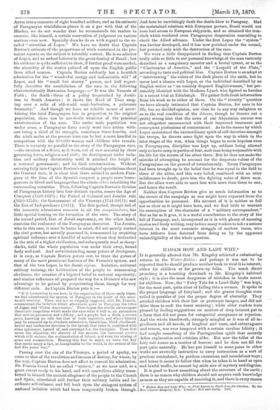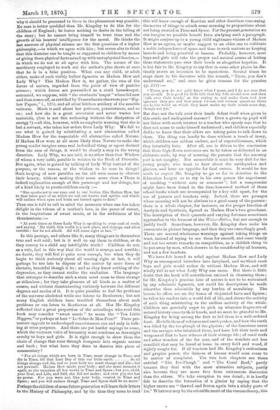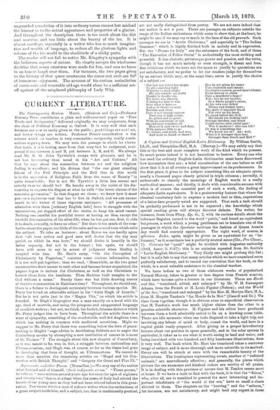MADAM HOW AND LADY WRY.*
Jr is generally allowed that Mr. Kingsley achieved a culminating success in the Water-Babies : and perhaps it was not to be expected that he should produce another book to rival it in interest, either for children or for grown-up folks. Too much direct preaching is a besetting drawback to Mr. Kingsley's habitual style ; it is also the most dangerous of mistakes in books meant for children. Now, the "Fairy Tale for a Land-Baby" was kept, for the most part, quite clear of falling into a sermon. It spoke in the proper language of fairyland ; and the graver thoughts were veiled in parables of just the proper degree of obscurity. They satisfied children with their fair or grotesque images, and did not drive them to seek the inner meaning ; while older readers were pleased by finding suggestions on matters of deep interest put in a form that did not press for categorical acceptance or rejection. And the whole handiwork, strangely mingled as it was of all in- gredients and all moods, of laughter and tears, and extravagance and reason, was ever tempered with a certain careless felicity ; it had caught something of the Pantagruelian spirit that securely defies explanation and criticism alike. But now the teller of the fairy tale comes as a teacher of lessons : and he does not fill the part quite naturally. He has put himself to some pains in other works not avowedly instructive to carry instruction as a sort of precious contraband, by perilous excursions and roundabout ways ; and hence it seems to follow that when he takes it in hand as open and lawful traffic, he cannot lay aside airs of mystery and disguise.
It is good to know something about the structure of the earth ; there is no reason why children should not acquire such knowledge as soon as they are capable of receiving it, and there is every reason
* Madam Row and Lads Why ; or, First Lessons in Earth Lore for Children. By the Bet Charles Kingsley, MA. London : Bell and Daldy. 1870.
why it should be presented to them in the pleasantest way possible. No man is better qualified than Mr. Kingsley to do this for the children of England; he leaves nothing to desire in the telling of the story ; but he cannot bring himself to trust time and the growth of his hearers' intelligence for the moral. He thinks the last answers of physical science are the first questions of a higher philosophy,—in which we agree with him ; but seems also to think
that this doctrine can be taught or suggested to children by means of giving them physical facts mixed up with metaphysical fancies,.—
in which we do not at all agree with him. The nature of the machinery employed to work out the author's plan shows at once that he is in a false position. What can any child, or adult either, make of such visibly hollow figments as Madam How and Lady Why ? This Madam How is, we gather, the sum of the forces of nature, regarded from the point of view of positive science ; which forces are personified' as a staid housekeeper, entrusted, we suppase, with "the everlastin' teapot " whose lid now and then comes off, as certified by Transatlantic observers (see "Big- low Papers," i., 125), and all other kitchen artillery of the sensible universe. Much is said about her patience, perseverance, and so ; and how she is a great economist and never wastes her materials, (but is not this reckoning without the dissipation of energy ?)—all this, however, with an emphatic warning that she is but a servant, who takes her orders from Lady Why. We fail to see what is gained by substituting a new abstraction called Madam How for the respectable old abstraction called Nature. If Madam How were at all more likely than Nature to make the young reader imagine some real individual thing or agent distinct from the sum of things, it would be clearly a step in the wrong direction. Lady Why, we are told, is no other than that Wisdom of whom a very noble parable is written ia the Book of Proverbs. But again, what is gained by talking of Lady Why instead of the purpose, or the reason, or the wisdom to be seen in things? Such heaping of new parables on the old ones seems to obscure their beauty, without making their sense more clear. a There is indeed explanation enough of this personage and her doings, but of a kind likely to puzzle children sorely :—
" She speaks not to our eyes and to our brains, like Madam How, but to that inner part of us which we call our hearts and spirits, and which will endure when eyes and brain are turned again to dust."
Then one is told to call to mind the moments when one has taken delight in the tokens of a mother's love, in the peace of sunset, in the inspirations of sweet music, or in the awfulness of the thunderstorm :—
"At such times as these Lady Why is speaking to your soul of souls, and saying, My child, this world is a new place, and strange, and often terrible: but be not afraid. All will come right at last.'" In this passage, and others like it, many things are in themselves true and well said ; but is it well to say them to children, or do they convey to a child any intelligible truth ? Children do not, as a rule, feel in this way that the world is strange and terrible; 1[10 doubt, they will feel it quite soon enough, but when they do
begin to think seriously about all coining right at last, it will perhaps be too late to dispose of the matter by mere force of rhetoric, beautiful though it be ; and as they know nothing of the depression, so they cannot realize the exaltation. The language that attempts to describe such a state must seem to them strange or ridiculous ; for they take pleasure of all kinds as a matter of course, and without discriminating curiously between the different degrees and modes of it. It is quite possible to feel the problems of the universe abolished while one listens to Beethoven ; but not many English children have troubled themselves about such problems or can listen to Beethoven at all. Has Mr. Kingsley reflected that a great proportion of the schoolboys who read this book may consider "sweet music" to mean the "Ten Little Niggers," or perhaps at best "Le Sabre de Mon Pere ?" These pre- mature appeals to undeveloped consciousness can end only in talk- ing at cross purposes. And there are yet harder sayings to come, which the common voice of humanity must condemn as downright cruelty to boys and girls. It is right enough to show them the chain of change that runs through inorganic into organic nature and back ; but what have they done to deserve this piece of eommentary?
"For all things which are born in Time, must change in Time, and die in Time, till that Last Day of this our little earth So all things change and die, and so your body too must change and die—but not yourself. Madam How made your body; and she must unmake it again, as she unmakes all her works in Time and Space ; but you, child, your Soul, and Life, and Self, she did not make; and over you she has no power. For you were not, like your body, created in Time and Space; and you will endure though Time and Space shall be no more."
Perhaps theebildren of some future generation will learn their letters in the History of Philosophy, and by the time they come to read
this will know enough of Kautian and other doctrines concerning the nature of things to attack some meaning to propositions about not being created in Time and Space. For the present generation we can imagine no possible benefit from studying such a paragraph.
It might conjure up to a young child nightmare visions of Madam How as an ogress, or maybe suggest to an older one to cultivate a noble independence of space and time in such matters as keeping bounds and being punctual at lessons. Probably, however, most boys and girls will take the proper and natural course of letting these statements pass over their heads as altogether hopeless. It is but fair to Mr. Kingsley to say that in seine other places he dis- tinctly avows an intention to be mysterious. Several times he stops short in his discourse with the remark, "There, you don't understand me," and once he gives reasons for the practice (p. 234) :—
'There, you do not quite know what I mean, and I do not care that you should. It is good for little folk that big folk should now and then talk over their heads,' as the saying is, and make them fool how ignorant they are, and how many solemn and earnest questions there are in the world on which they must make up their minds some day, though not yet."
But does not the talk over their heads defeat itself when given in this crude and undisguised manner? Even a grown-up pupil will not listen with much interest to a teacher who openly says that ho does not mean to make himself understood ; and children especially dislike to know that their elders are taking pains to talk down to them. The thing can hardly be done without a touch of irony, which children can seldom endure, and of superciliousness, which they invariably hate. After all, one is driven to the conclusion that these high-flown sentences are to be taken as delivered in an
elaborate aside, by way of assuring the parents that the amusing part is not naughty. But meanwhile it must be very dull for the young people, who want to hear about the earthquakes and glaciers, and have no appetite for filial causes. It would be too much to expect Mr. Kingsley to go so far in devotion to the Education League as to try in his own person the experiment of teaching "without note or comment "; but a compromise might have been found in the time-honoured method of those
school-books which are accompanied by a key sold apart, for the use of parents and teachers only. Indeed, there are passages whose meaning will not be obvious to a good many of the parents: there is a whole chapter, for instance, on the proper function of Analysis and Synthesis, figured as Madam How's two grandsons. The description of their quarrels and varying fortunes sometimes approaches to the humour of the Iliater-Babies, but not enough to justify itself. Sometimes, however, Mr. Kingsley does make his comments in plainer language, and then they are exceedingly good. There are several wholesome warnings against taking things on
trust, instead of trying to see them for oneself, and some timely and not too severe remarks on competition, as a childish thing to be put away by men, which deserve to be considered by all learners, and not a few teachers.
We have felt bound to rebel against Madam How and Lady
Why as uncongenial intruders into fairyland, and we thiuk most boys and girls would rather do without Madam How, and will wholly fail to see what Lady Why can mean. But there is little
doubt that the book will nevertheless succeed in charming them ; for Mr. Kingsley's genuine love of nature is not to be restrained by any scholastic figments, nor could his descriptions be made otherwise than admirable by any burden of moralizing. The lessons he offers are no dry bones of disjointed facts and figures ; he takes his readers into a world full of life, and shows the activity of each thing ministering to the endless activity of the whole. Children are generally eager to pick up whatever fragments of natural history come to their hands, and we must be grateful to Mr. Kingsley for being among the first to bid them to a well-ordered feast. Ile tells them of volcanos and earthquakes, and how the earth was tilled by the ice-plough of the glaciers; of the limestone caves and the savages who inhabited them, and have left their tools and weapons of flint to bear witness of their strange life ; of coral reefs and other wonders of the far seas, and of the wonders not less manifold that may be found at home in every field and wood, if rightly sought for. If all teachers had Mr. Kingsley's enthusiasm
and graphic power, the dulness of lessons would soon cease to be matter of complaint. The two best chapters are those entitled "The ice-Plough" and " The Coral Reef," partly because they deal with the most attractive subjects, partly also because they are more free from extraneous discussion than the others. We take exception to one detail ; it is hardly fair to describe the formation of a glacier by saying that the higher MOW are "thawed and frozen again into a sticky paste of ice." Whatever may be the scientific merit of the viscous theory, this
unguarded translation of it into ordinary terms cannot but mislead the learner as to the actual appearance and properties of a glacier. And throughout the description there is too much about the dirt and moraine, and too little about the beauty of the ice. It is almost sacrilege, especially in a writer who has so much imagina- tion and wealth of language, to reduce all the glorious lights and colours of the ice-world to the similitude of a sticky paste.
The reader will not fail to notice Mr. Kingsley's sympathy with the ludicrous aspects of nature. He clearly accepts the wholesome doctrine that many creatures were made for fun, and sees no harm in an honest laugh over them. For instance, the two pages given to the history of that queer crustacean the cocoa-nut crab are full of humorous it,joyment. The account of his curious assimilation of cocoa-nuts and venerable old age would alone be a sufficient set- off against all the misplaced philosophy of Lady Why.










































 Previous page
Previous page